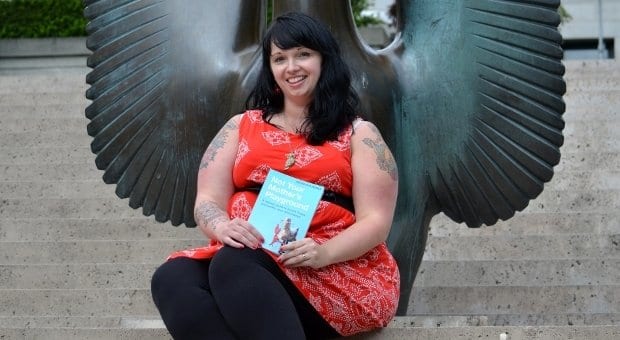Samantha Fraser gave the keynote address at PolyCon, Vancouver’s first-of-its-kind polyamory conference, which took place May 31 to June 2.
At 33 years old, she left her job teaching video-game design to write her new book, Not Your Mother’s Playground: A Realistic Guide to Honest, Happy, and Healthy Open Relationships.
Now she tackles what she calls “polyamorous elitism” in her writing and activism.
Xtra chatted with Fraser after her expletive-filled PolyCon workshop “How Not To Be a Polyamorous Elite Douchenozzle.” This is an excerpt from that interview.
Xtra: You were profiled in Toronto Life recently, and you talk in your workshop about the impression the media get that polyamory is mostly white, heterosexual, mainstream and middle class.
Samantha Fraser: It’s not. The lesbian and gay community have been involved in polyamory for such a long time. Non-monogamy is so much more accepted by so many people who aren’t considered heteronormative. I know a lot of people in those communities who will say, “Well, yeah, we’ve been doing this forever. Way to catch up with the times.”
So why don’t they show up to this kind of event?
I’m not entirely sure. I think there’s a disconnect between lots of different communities. I think it’s so easy for us to get attached to our own people, our own kind, our own tribe.
The gay community has been non-monogamous for years. What are they going to gain from all these new heterosexual people coming along and saying, “I want to sleep with other people.” What’s in it for them?
What is in it for them?
I think there are always things to gain from any sort of human interaction, regardless of someone’s sexual or gender orientation. Everybody has something to offer. Maybe I’m a bit of an idealist. I think everyone can bring something to the table.
But then, sometimes we can’t.
Speaking of not bringing things to the table, let’s talk about douchenozzles.
Let’s.
What, in a nutshell, is a poly elite douchenozzle?
There are different kinds, but really, somebody who looks at somebody else and says, “You know what, there’s only one way to do poly; what I’m doing is right, what you’re doing is wrong,” and doesn’t allow for flexibility, judges people based on how they choose to do things, doesn’t offer support and guidance, and doesn’t come to the table with anything.
So, you call people douchenozzles and dicks and assholes a lot in your blog. You obviously have a message you want to get across.
Do I really do that? Am I a bad person? At the end of the day, I really do support people having their ways of life and ways of thinking. I just want other people to do that, too.
Really, the focus is for people to just be nicer to one another, to be more accepting, and to learn how to talk to one another. At the end of the day, I just want people to be happy and really know what that means. When I say that, it makes me feel a lot better about myself.
So, you want people to be nicer to each other, and your part of that is to . . .
Call them out on their shit? Yeah. But at events like this, I like to pose questions to people — “Here’s a question for everyone: has anyone ever done this?” And hopefully someone might leave the room and they’ll go, “Oh, yeah, I did that. Oops.”
Do you ever listen to people in your workshop and think, “Douchenozzle. That person. Right there.”
Absolutely. Yep.
What are the problems in the poly community you would like to correct?
There’s a lot of infighting. There are a lot of people from different sides suggesting what they’re doing is the right way to do it and not allowing other people to be what they want. Polyamory is not like monogamy. We’re not a cookie-cutter thing.
Tell me about your book, Not Your Mother’s Playground.
I started thinking about writing the book about five years ago, because I found that a lot of the stuff out there was either really hippy dippy or very one-sided. The main problem I had was it tended to be very flowers and bunnies and sunshine and light. Being poly is “Here you go, it will be fine, it will be really easy, just follow these steps.” And I just disagree with that so much.
So when we talk about hippy-dippy fairy stuff, are we talking about Opening Up and The Ethical Slut?
I think Opening Up is fantastic, and I use it as a reference throughout. But I find that it can be a bit challenging for people who are really new and who need to pick up and play, as we say in the video-game industry. Mine is more conversational.
The Ethical Slut was the first book that we read. There’s this section that I should learn verbatim about breakups: “You’ll be in a relationship with one person, and maybe things won’t work out, ups and downs, and then you’ll be friends and then maybe you’ll sleep together again.” It just felt so fake.
When I went through my first poly breakup, it was devastating. The idea that everything could be presented in an idealistic, “everything’s fine” way angered me. It’s not true. I wanted to show that there’s reality here, and it’s hard.
Are you an angry person?
I’m a very happy person. I have things I feel very strongly about. I get mad at people who turn left and don’t put their signal on. They really piss me off. And ignorant people. But I’m not an angry person. I think people are wrong, but I don’t yell at them, because I don’t want to get yelled at.
Is that the core of your philosophy?
Yeah. Live and let live, but don’t be a dick.


 Why you can trust Xtra
Why you can trust Xtra


